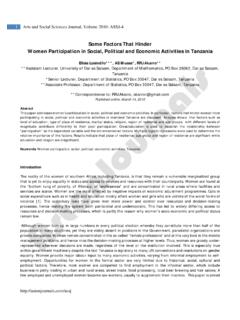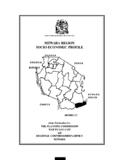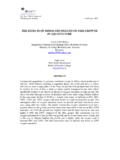Transcription of Tanzania’s cooperatives look to the future - Andrew Bibby
1 Tanzania s cooperatives look to the future Andrew Bibby NOTE: This paper was written in January 2006. It has been downloaded from Andrew Bibby s website, More information can be found on that site. Use for commercial purposes prohibited without prior written permission from the copyright holder. This text has been placed here as a facility for Internet users and downloading is permitted for the purposes of private, non-commercial research. The text must not be modified, nor this copyright notice removed. 2 Tanzania s cooperatives look to the future 3A time of change This is a time of change for Tanzania s cooperatives . cooperatives in Tanzania have a long history, dating back to the late 1920s. In times past, they played a vital role in rural and urban economic and social development of the country.
2 However, more recently the image has become a negative one. For many people in Tanzania, coops are seen as stuck in the past, unable to cope with modern economic realities. Far from being models of member self-empowerment, their image is tarnished by poor administration and leadership, poor business practice, and by corruption. cooperatives developed historically in Tanzania as elsewhere in the world because they performed a valuable role. That role remains as relevant as ever today. Without cooperatives , small producers are left with almost no form of collective organisation, at an immense disadvantage when taking their products or crops to the market. Without savings and credit cooperatives , many poor people have no safe home for their savings and nowhere to go for loans. Coops can also provide solutions through collective action in other areas, too, such as fisheries, forestry, minerals and housing.
3 If they are to meet their potential in the future , however, a comprehensive transformation of cooperatives in Tanzania will be necessary. The task is to focus back on the key cooperative principle: that coops are owned and controlled by their own members. The purpose of coops is, above all, to fulfil their members economic and social needs. To achieve their goals, cooperatives need to be commercially viable enterprises, able to survive and prosper in the marketplace. To be sustainable, cooperatives have to be run on a business-like footing. In contrast to other businesses, however, the rewards from their trading activity are available to be shared between all the members, on a collective basis. 4A number of important initiatives in the past five years have put in place the foundations for a rebirth of Tanzania s cooperative sector.
4 They include the 2000 Special Presidential Committee on reviving cooperatives and new cooperative legislation of 2003. These and other efforts have culminated in the production of a key strategic document, The cooperative Reform and Modernisation Program 2005-2015. This report (a home grown initiative rather than the product of external consultants) has been produced with the direct involvement of the Tanzanian cooperative movement. It is honest about the problems: it identifies problems of poor management, inappropriate coop structures, corruption and embezzlement, lack of working capital, lack of cooperative democracy and education, weakness of supporting institutions and, in general, an inability to compete in a liberalised market economy. However, it also sets out detailed strategies for overcoming this problematic inheritance.
5 The goals of the Reform and Modernisation Program are clearly identified: Economically strong cooperative societies, capable of facing competitive challenges Strong savings and credit cooperatives , providing better services and offering a source of capital for cooperatives An empowered membership Good governance and accountability in cooperative societies. A network of cooperatives with efficient and cost effective structures, able to respond easily to the needs of their members. The Program links directly with MKUKUTA, the National Strategy for Growth and Reduction of Poverty adopted in June 2005. The message, recognised by strong government support for the cooperative reform agenda, is that cooperatives have 5a significant role to play in helping the country meet the goals set out in MKUKUTA.
6 This booklet has been produced to bring the message of the cooperative Reform and Modernisation Program to a wider audience. It explores the key aspects of the strategy for change, and identifies some existing examples of good practice. It also offers a wider perspective because Tanzania is not alone in rediscovering the potential of cooperatives for economic development and poverty reduction. Recent events, including the International Labour Organization s Promotion of cooperatives Recommendation (2002), signal a renewal of interest worldwide in the potential of cooperatives , as grassroots member-led agencies for development and social change. 6 Promoting member empowerment and healthy cooperative democracy cooperatives are internationally recognised as enterprises democratically owned and controlled by their members.
7 To meet their full potential, Tanzania s cooperatives need to have members who feel able to participate and actively engage in the life of their organisation. As the Reform and Modernisation Program puts it, it is only when the grassroots membership is empowered that Tanzania will see a true emergence of democratic and economically viable cooperatives . Thus far, it admits, the involvement and participation of members remains weak. Strong emphasis, therefore, is given to the need for member empowerment, as a key part of the work of rebuilding cooperatives in Tanzania. This is described as a process of power sharing with the ordinary members, in order to build their confidence and their ability to manage their own economic affairs and their cooperative organisation . Empowering members requires the creation of an enabling environment, one which encourages participatory ways of tackling and solving problems.
8 It also requires a change of attitude on the part of cooperative leaders and support workers, so that they become facilitators and agents for change. Fortunately, there is already firm evidence that this can be achieved. Between 1996 and 2000, an innovative pilot programme promoting member empowerment took place in the Kilimanjaro and Arusha regions. A total of 171 primary societies participated in the project, known as MEMCOOP. About 60,000 coop members went through a MEMCOOP training programme, and additional training was held for well over 2000 committee members and coop secretaries. It is clear, both from academic research and from empirical data, that the programme successfully helped change the behaviour and attitudes of members, so that they felt a new sense of ownership over their cooperatives . There were 7strong business benefits, too.
9 For example, coffee marketing coops participating in the programme obtained an average price of 1,286/- per kg of coffee in 2003/4; the average for coops outside the programme was, by contrast, only 600/-. The MEMCOOP programme also stressed the need to involve women in cooperatives , and to seek more involvement from disadvantaged groups such as young people and the disabled. The Reform and Modernisation Program calls for this experience in member empowerment to be replicated throughout the country. The Program sets out a detailed series of intended interventions, targeted at coop members, coop leadership and coop support institutions. What s happening already? cooperative awareness sessions are being run for new would-be cooperatives before they become formally registered. These sessions, open to all, explain the responsibilities of membership and summarise the working of the new cooperative law.
10 The process of re-establishing cooperative Boards through special elections (see below) is providing an opportunity for members to find out more about the cooperative reform process. The global picture The internationally agreed cooperative Statement of Identity and Principles was approved by the International cooperative Alliance in 1995. The second cooperative Principle, Democratic Member Control, includes the following text: cooperatives are democratic organisations controlled by their members, who actively participate in setting their policies and making decisions. Men and women serving as elected representatives are accountable to the membership . 8 Dasico (Dar Es Salaam Small Industries cooperative ) members at a General Meeting of the cooperative . Dasico is one of the oldest cooperatives in the Dar Es Salaam area, currently with 398 members.




